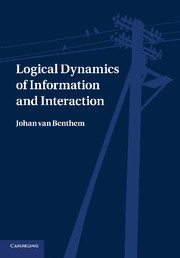Book contents
- Frontmatter
- Contents
- Preface
- Acknowledgments
- 1 Logical dynamics, agency, and intelligent interaction
- 2 Epistemic logic and semantic information
- 3 Dynamic logic of public observation
- 4 Multi-agent dynamic-epistemic logic
- 5 Dynamics of inference and awareness
- 6 Questions and issue management
- 7 Soft information, correction, and belief change
- 8 An encounter with probability
- 9 Preference statics and dynamics
- 10 Decisions, actions, and games
- 11 Processes over time
- 12 Epistemic group structure and collective agency
- 13 Logical dynamics in philosophy
- 14 Computation as conversation
- 15 Rational dynamics in game theory
- 16 Meeting cognitive realities
- 17 Conclusion
- References
- Index
17 - Conclusion
Published online by Cambridge University Press: 07 October 2011
- Frontmatter
- Contents
- Preface
- Acknowledgments
- 1 Logical dynamics, agency, and intelligent interaction
- 2 Epistemic logic and semantic information
- 3 Dynamic logic of public observation
- 4 Multi-agent dynamic-epistemic logic
- 5 Dynamics of inference and awareness
- 6 Questions and issue management
- 7 Soft information, correction, and belief change
- 8 An encounter with probability
- 9 Preference statics and dynamics
- 10 Decisions, actions, and games
- 11 Processes over time
- 12 Epistemic group structure and collective agency
- 13 Logical dynamics in philosophy
- 14 Computation as conversation
- 15 Rational dynamics in game theory
- 16 Meeting cognitive realities
- 17 Conclusion
- References
- Index
Summary
This book has presented a logical theory of agents that receive and exchange information. It shows how the programme of Logical Dynamics can deal with inference, observation, questions, communication, and other informational powers in one uniform methodology, putting the relevant actions and processes explicitly in the logic, and making use of all major kinds of information: semantic and syntactic. The agents involved in all this have knowledge, beliefs, and preferences – and thus, our systems incorporated knowledge update by observation and inference, varieties of belief revision and learning, and even acts of evaluation and preference change providing a richer motivating dynamics behind the pure kinematics of information. Moreover, from the start, a focus on single agents was not enough: interaction with others is of the essence in argumentation, communication, or games. Our logics dealt with multi-agent scenarios that led to longer-term interaction over time in larger groups, linking up eventually with temporal logic, game theory, and social choice theory. The resulting systems are perspicuous in design, and the dynamic stance also raises many new problems for technical research and philosophical reflection.
More concretely, this book contains a coherent series of technical results on logics of agency, and it generates many further open problems now that the basic theory is in place. Many of these problems are enumerated at the end of chapters. Some are just interesting further paths where readers might stroll, while others represent more urgent tasks given the current limitations of the framework. Of the latter, I would mention dynamic logics over neighbourhood models as more fine-grained representations of information, predicate-logical versions of our propositional dynamic logics that can deal with objects, and also, the logical dynamics of changing languages and concepts. But also, there are challenges in building further bridges between dynamic-epistemic logic and mathematical logic, as well as areas of mathematics like probability theory and dynamical systems. A final challenge is putting together our separate systems for informational and evaluative actions into richer logical models for cognitive agents. Questions and inference were natural companions right at the start of this book, inference and corrective acts of belief revision were another natural pair, and we studied even more complex kinds of entanglement adding preference and action, in the setting of games. But we are far from understanding the total behaviour of the appropriate combined systems and of the factors that determine complexity as subsystems are linked.
- Type
- Chapter
- Information
- Logical Dynamics of Information and Interaction , pp. 342 - 345Publisher: Cambridge University PressPrint publication year: 2011



